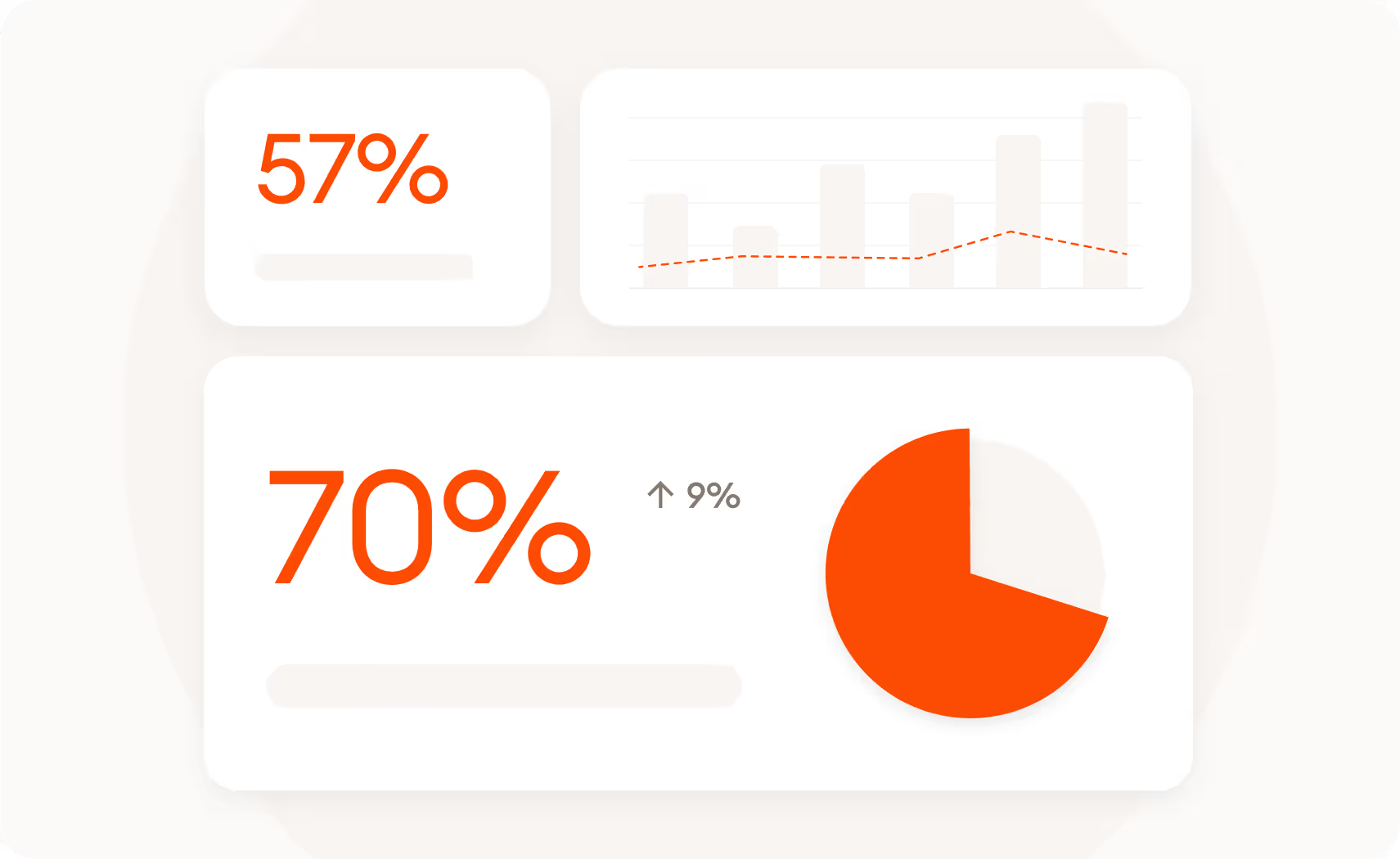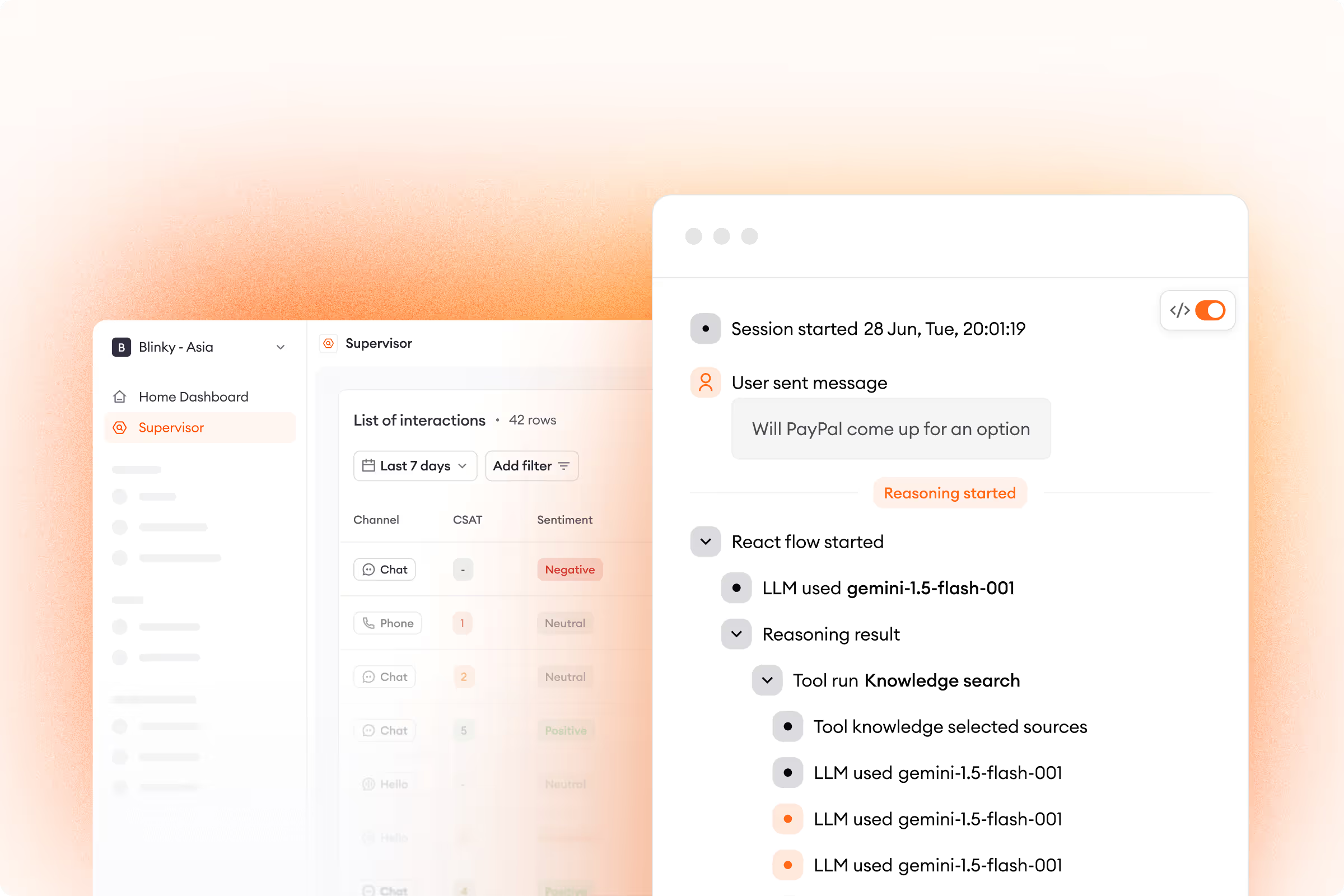The adoption of artificial intelligence (AI) has accelerated in recent years, transforming the business world and revolutionizing the customer service industry. What was once a futuristic concept is now a critical component of modern business strategy.
With AI-powered software becoming a necessity for businesses looking to stay competitive in the digital age, it's important to understand the impact it's having on the state of customer service.
We've compiled 50+ need-to-know customer service stats that demonstrate the growing importance of AI in customer care. Let's take a closer look at the numbers.
50+ vital customer service statistics
General trends
AI’s applications in customer support have expanded considerably in recent years, and this growth is only expected to continue. Here’s a look at some recent trends in regards to AI’s ongoing impact to customer service.
- At present, the conversational AI market is worth $10.7B and growing at an annual rate of 22%. (GlobeNewswire)
- The conversational AI market’s value is expected to hit $32.6B by 2030. (Allied Market Research)
- The conversational AI market is expected to grow 3x by 2028. (GlobeNewswire)
- By 2025, AI will power 95% of customer interactions. (AI Business)
- Chatbots are the most common AI use case in business today. (Forbes)
- 81% of customers prefer using a self-service option before contacting a customer service rep. (HubSpot)
- Most shoppers regularly use 3 to 5 customer service channels to get their issues resolved. (Microsoft)
- 83% of companies consider adding AI to their strategy a high-priority initiative. (Tidio)
- 90% of companies see AI as a source of their competitive advantage over rivals. (MIT Sloan)
- 37% of businesses have implemented some form of AI. The share of companies employing AI has grown 270% over the past 4 years. (Gartner)
- AI chatbots let businesses save up to 2.5B hours of work for customer support reps a year. (Demand Sage)
- 54% of customers have a more favorable view of brands that respond to customer service questions over social media. For millennials, that figure has climbed to 80%. (Microsoft)

The costs of bad customer service
AI isn’t just a fad everyone is latching on to — it’s an effective solution to some of the most widespread service issues. Poor customer service can cause companies all kinds of headaches, leading to bad experiences for shoppers. AI-infused solutions are uniquely equipped to tackle these problems head-on.
- Companies lose between $75B and $1.6T annually due to poor customer support. (Midlands Technical College)
- Negative experiences cost businesses $4.7T in missed opportunities each year. (Qualtrics)
- 61% of customers have switched brands because of poor customer service. (Appinventiv)
- 74% of US consumers cited having a poor customer service experience in 2022 at least once, an 8% rise from 2021. (Wall Street Journal)
- Customer service agents only ask for a customer’s name in 21% of conversations. (Zowie)
- 73% of customers expect the ability to start on one communication channel and continue on another without restarting, but only 33% of companies offer omnichannel support across online chat, email, social media, and more. (Zendesk)
- Nearly one-third of American customers cite a lack of effectiveness as their top frustration when dealing with customer service. (Statista)
- 78% of shoppers have abandoned a transaction because of a negative service experience. (American Express)
AI’s role in excellent customer service
Customer expectations have never been higher, and introducing AI simultaneously addresses these demands while augmenting agent productivity. Bolstering your customer service team with AI automation can bring several benefits.
- AI-powered virtual assistants can automate 70%+ of customer queries. (Zowie)
- 90% of customers expect an “immediate” response when asking a customer service question. (HubSpot)
- 58% of customer support teams use at least one kind of process or workflow automation. (Salesforce)
- The #1 reason businesses use conversational AI is to improve agent productivity. (Zendesk)
- Generative AI has been shown to increase worker productivity by 14%. (Bloomberg)
- 61% of employees say AI makes them more productive and efficient. (SnapLogic)
- 83% of businesses feel AI lets them assist more customers. (Dialpad)
- AI-powered personalization measures can boost employee engagement by 20%. (McKinsey)
- 79% of employees say AI helps improve business performance. (Capterra)
- 96% of employees say AI increases their productivity. (Capterra)
- Companies are reporting productivity increases of up to 400% as a result of generative AI. (Forbes)
- AI chatbots let businesses save up to 2.5B hours of work for customer service representatives a year. (Demand Sage)
Elevating the customer experience
AI does much more than improve support metrics — it can also be a boon for customers, converting frustrating experiences into positive ones. AI tools have been shown to improve customer satisfaction, brand loyalty, and shoppers’ general perception of a brand.
- 73% of shoppers believe AI can positively impact the customer experience. (Statista)
- 80% of customers who interact with an AI chatbot have a positive experience. (Uberall)
- Half of customers expect AI to save them from having to repeat themselves. (Zendesk)
- 82% of American consumers are willing to share their customer data for a good customer service experience. (Wire19)
- AI software increases CSAT scores by an average of 12%. (Zowie)
- Positive customer experiences can raise customer satisfaction by as much as 20%. (McKinsey)
- Companies that offer an excellent customer experience grow revenues 4%–8% faster than their markets. (Bain & Company)
- 64% of business owners believe AI will improve customer relationships. (Forbes Advisor)
- 80% of business leaders say improving CX is a high priority, but only 6% of brands saw their CX quality increase in 2023. (Forrester)
Conversational AI’s financial impact
In customer service, AI is already offering businesses a financial benefit. Beyond answering customer questions, AI software cuts costs, generates revenue, and promotes better business decisions.
- Implementing AI in customer service can reduce costs by up to 30%. (VentureBeat)
- Successfully applying AI could increase a company’s profitability by an average of 38% by 2035. (Accenture)
- 3 in 4 companies that add AI see new product sales increase by over 10%. (Capgemini)
- 86% of shoppers are willing to spend more after receiving a positive customer experience. (SuperOffice)
- 60% of shoppers say they’ll become repeat customers if they receive a personalized experience. (Twilio)
- 80% of self-identified frequent shoppers only purchase products from businesses that deliver customized experiences. (SmarterHQ)
- 66% of customer service professionals say AI has improved business performance by analyzing customer feedback. (Dialpad)
- AI-powered proactive chat is able to raise conversion rates by 15%. (Zowie)
- AI customer service can increase average order value (AOV) by as much as 47%. (Zowie)
- The average contact center conversation with a human costs $8. The average customer service interaction via chatbot costs 10 cents. (Gartner)
Take advantage of AI today
The role of AI in providing great customer service is becoming more pronounced every day, and businesses that fail to harness this technology’s power now risk falling far behind their competitors.
By starting with something as simple as a chatbot, companies can assist customers with greater efficiency and unlock their growth potential — all thanks to AI.

.avif)

.avif)
.svg)







